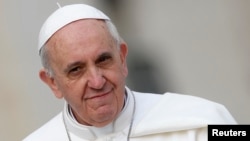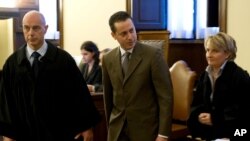VATICAN CITY —
Pope Francis, in his first major decision, on Saturday set up an advisory board of cardinals from around the world to help him govern the Catholic Church and reform its troubled central administration.
The eight cardinals will help him put into place changes in an administration which has been held responsible for some of the mishaps and scandals that plagued the eight-year reign of Pope Benedict before he resigned in February.
A Vatican statement said the group would "advise him in the governing of the universal Church" as well as in making administrative changes, a sign that Francis wants to consult more widely than Benedict did before making decisions.
The eight prelates come from Italy, Chile, India, Germany, Democratic Republic of Congo, the United States, Australia, and Honduras, indicating that Francis intends to take seriously calls by bishops from around the world to have more say in Vatican decisions that affect their areas.
An Italian archbishop will act as secretary of the group, which will hold its first formal meeting in October in Rome. Francis, who was elected exactly one month ago, has already been in contact with each of them, the statement said.
The group will also study changes to a constitution by the late Pope John Paul II called "Pastor Bonus," which gave the Curia, the name by which the various departments that run the Church is known, its current structure in 1988. The last major reform of the Curia was carried out by Pope Paul VI in 1967.
Francis inherited a Church struggling to deal with priests' sexual abuse of children, the alleged corruption and infighting in the central administration, and conflict over the running of the Vatican's scandal-ridden bank.
Benedict left a secret report for Francis on the problems in the administration, which came to light when sensitive documents were stolen from the pope's desk and leaked by his butler in what became know as the "Vatileaks" scandal.
Basic failings
The basic failings of the Curia were aired, sometimes passionately, at closed-door meetings of cardinals before they retired into the conclave that elected Francis.
The Vatican statement said Francis set up the group to respond to specific suggestions during those meetings.
Cardinals suggested changes to the Curia to made it a model of good governance, including introducing term limits on Vatican bureaucrats to prevent an atmosphere of "careerism" that critics said led to some of the infighting and scandals.
Anger at the mostly Italian prelates who run the Curia was one of the reasons that cardinals chose the first non-European pope for 1,300 years and quashed the chances of one of the front-runners, Milan Archbishop Angelo Scola.
Benedict's butler, Paolo Gabriele, was arrested and sentenced by a Vatican court to 18 months in prison last year but Benedict pardoned him and he was freed just before Christmas.
Benedict's Secretary of State, Italian Cardinal Tarciscio Bertone, has been widely blamed for the failings of the Curia to govern the 1.2 billion-member Church properly.
Cardinal Giuseppe Bertello, the current governor of Vatican City who is now also a member of the new advisory board, has been tipped to succeed Bertone as the Vatican's number two.
The person Francis chooses to succeed Bertone - who is still in his post - will be among his most important decisions because he will be instrumental in helping the new pope set the tone for a humbler Church following a period of scandals.
Besides Bertello, the other cardinals on the advisory board are Francisco Javier Errazuriz Ossa of Santiago, Chile, Oswald Gracias of Bombay, Reinhard Marx of Munich, Laurent Monsengwo Pasinya of Kinshasa, Sean Patrick O'Malley of Boston, George Pell of Sydney, and Oscar Andres Rodriquez Maradiaga of Tegucigalpa, Honduras.
Bishop Marcello Semeraro of Albano, Italy, will serve as secretary.
The eight cardinals will help him put into place changes in an administration which has been held responsible for some of the mishaps and scandals that plagued the eight-year reign of Pope Benedict before he resigned in February.
A Vatican statement said the group would "advise him in the governing of the universal Church" as well as in making administrative changes, a sign that Francis wants to consult more widely than Benedict did before making decisions.
The eight prelates come from Italy, Chile, India, Germany, Democratic Republic of Congo, the United States, Australia, and Honduras, indicating that Francis intends to take seriously calls by bishops from around the world to have more say in Vatican decisions that affect their areas.
An Italian archbishop will act as secretary of the group, which will hold its first formal meeting in October in Rome. Francis, who was elected exactly one month ago, has already been in contact with each of them, the statement said.
The group will also study changes to a constitution by the late Pope John Paul II called "Pastor Bonus," which gave the Curia, the name by which the various departments that run the Church is known, its current structure in 1988. The last major reform of the Curia was carried out by Pope Paul VI in 1967.
Francis inherited a Church struggling to deal with priests' sexual abuse of children, the alleged corruption and infighting in the central administration, and conflict over the running of the Vatican's scandal-ridden bank.
Benedict left a secret report for Francis on the problems in the administration, which came to light when sensitive documents were stolen from the pope's desk and leaked by his butler in what became know as the "Vatileaks" scandal.
Basic failings
The basic failings of the Curia were aired, sometimes passionately, at closed-door meetings of cardinals before they retired into the conclave that elected Francis.
The Vatican statement said Francis set up the group to respond to specific suggestions during those meetings.
Cardinals suggested changes to the Curia to made it a model of good governance, including introducing term limits on Vatican bureaucrats to prevent an atmosphere of "careerism" that critics said led to some of the infighting and scandals.
Anger at the mostly Italian prelates who run the Curia was one of the reasons that cardinals chose the first non-European pope for 1,300 years and quashed the chances of one of the front-runners, Milan Archbishop Angelo Scola.
Benedict's butler, Paolo Gabriele, was arrested and sentenced by a Vatican court to 18 months in prison last year but Benedict pardoned him and he was freed just before Christmas.
Benedict's Secretary of State, Italian Cardinal Tarciscio Bertone, has been widely blamed for the failings of the Curia to govern the 1.2 billion-member Church properly.
Cardinal Giuseppe Bertello, the current governor of Vatican City who is now also a member of the new advisory board, has been tipped to succeed Bertone as the Vatican's number two.
The person Francis chooses to succeed Bertone - who is still in his post - will be among his most important decisions because he will be instrumental in helping the new pope set the tone for a humbler Church following a period of scandals.
Besides Bertello, the other cardinals on the advisory board are Francisco Javier Errazuriz Ossa of Santiago, Chile, Oswald Gracias of Bombay, Reinhard Marx of Munich, Laurent Monsengwo Pasinya of Kinshasa, Sean Patrick O'Malley of Boston, George Pell of Sydney, and Oscar Andres Rodriquez Maradiaga of Tegucigalpa, Honduras.
Bishop Marcello Semeraro of Albano, Italy, will serve as secretary.






